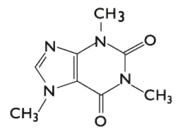caffeine: update
05 Mar 2006 Well, it’s been approximately 8 days since I cut caffeine out completely. I am still getting pretty intense headaches – how sad is that? But in general I am starting to feel better, and I can now wake up in the morning and not feel horrible without coffee.
Well, it’s been approximately 8 days since I cut caffeine out completely. I am still getting pretty intense headaches – how sad is that? But in general I am starting to feel better, and I can now wake up in the morning and not feel horrible without coffee.
There’s quite a bit of interesting science surrounding caffeine’s effects and its addiction (as with most addictions). Caffeine works by binding to adenosine receptors, which causes some neurological black magic stuff to happen, and the result is increased levels of epinephrine and norepinephrine. But the caffeine molecule itself isn’t solely responsible for its effects. It’s metabolized into three other molecules: paraxanthine, theobromine, and theophylline, which all have their own effects as well. Theobromine in particular is a vasodilator, which increases oxygen flow to the brain. Mmmm, oxygen.
But, when you suddenly stop getting caffeine, the headaches actually come not from “missing” any of these effects, but rather from an oversensitivity to adenosine, which causes low blood pressure and an excess of blood in the head, which hurts. It hurts a lot. Oh god it hurts so bad.
Anyways, the interesting thing about theobromine is that it’s also the alkaloid found in chocolate. It’s a common myth that chocolate has caffeine, which it doesn’t. But it does have loads of theobromine, which gives you a nice, longer, mellower “high” than caffeine does. However when most people talk about being “addicted” to chocolate, even though they probably like to think it’s caffeine or even theobromine, it’s probably more likely that they’re addicted to sugar. It’s by far the most powerful substance in chocolate, metabolically speaking.
So, I’ve been eating chocolate in various forms over the past week in a vain attempt to stave off the headaches, and it may have been helping a bit, at least psychosomatically. It’s a good excuse to eat chocolate, in any event. Today I made some hot chocolate that really kicked ass:
- 1 mug of Westsoy Chocolate Soymilk (sweetened with splenda)
- Heaping tablespoon of cocoa powder
- Splenda to taste
Good stuff.